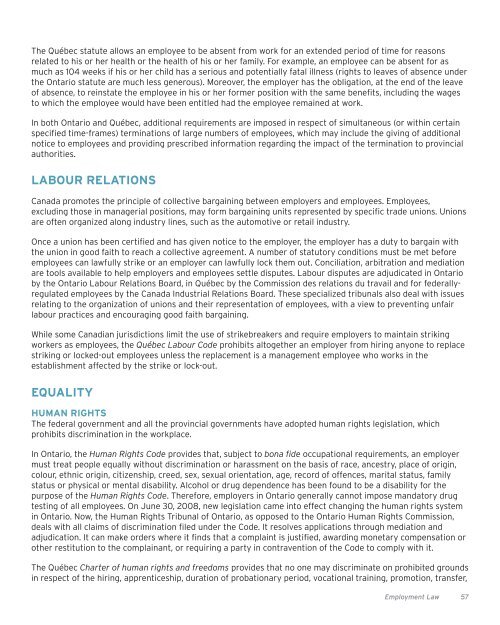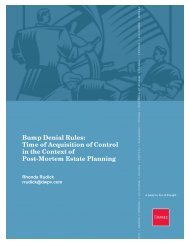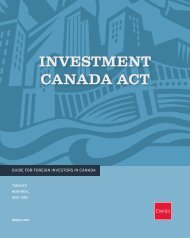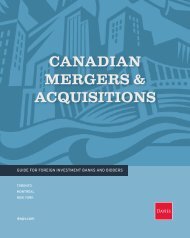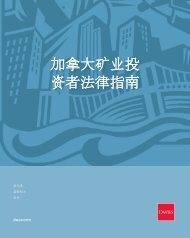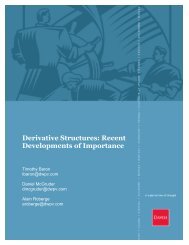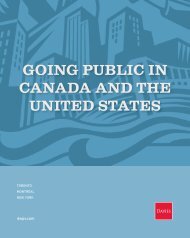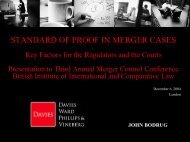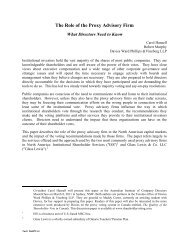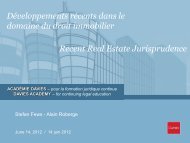doing business in canada - Davies Ward Phillips & Vineberg LLP
doing business in canada - Davies Ward Phillips & Vineberg LLP
doing business in canada - Davies Ward Phillips & Vineberg LLP
- No tags were found...
Create successful ePaper yourself
Turn your PDF publications into a flip-book with our unique Google optimized e-Paper software.
The Québec statute allows an employee to be absent from work for an extended period of time for reasonsrelated to his or her health or the health of his or her family. For example, an employee can be absent for asmuch as 104 weeks if his or her child has a serious and potentially fatal illness (rights to leaves of absence underthe Ontario statute are much less generous). Moreover, the employer has the obligation, at the end of the leaveof absence, to re<strong>in</strong>state the employee <strong>in</strong> his or her former position with the same benefits, <strong>in</strong>clud<strong>in</strong>g the wagesto which the employee would have been entitled had the employee rema<strong>in</strong>ed at work.In both Ontario and Québec, additional requirements are imposed <strong>in</strong> respect of simultaneous (or with<strong>in</strong> certa<strong>in</strong>specified time-frames) term<strong>in</strong>ations of large numbers of employees, which may <strong>in</strong>clude the giv<strong>in</strong>g of additionalnotice to employees and provid<strong>in</strong>g prescribed <strong>in</strong>formation regard<strong>in</strong>g the impact of the term<strong>in</strong>ation to prov<strong>in</strong>cialauthorities.LABOUR RELATIONSCanada promotes the pr<strong>in</strong>ciple of collective barga<strong>in</strong><strong>in</strong>g between employers and employees. Employees,exclud<strong>in</strong>g those <strong>in</strong> managerial positions, may form barga<strong>in</strong><strong>in</strong>g units represented by specific trade unions. Unionsare often organized along <strong>in</strong>dustry l<strong>in</strong>es, such as the automotive or retail <strong>in</strong>dustry.Once a union has been certified and has given notice to the employer, the employer has a duty to barga<strong>in</strong> withthe union <strong>in</strong> good faith to reach a collective agreement. A number of statutory conditions must be met beforeemployees can lawfully strike or an employer can lawfully lock them out. Conciliation, arbitration and mediationare tools available to help employers and employees settle disputes. Labour disputes are adjudicated <strong>in</strong> Ontarioby the Ontario Labour Relations Board, <strong>in</strong> Québec by the Commission des relations du travail and for federallyregulatedemployees by the Canada Industrial Relations Board. These specialized tribunals also deal with issuesrelat<strong>in</strong>g to the organization of unions and their representation of employees, with a view to prevent<strong>in</strong>g unfairlabour practices and encourag<strong>in</strong>g good faith barga<strong>in</strong><strong>in</strong>g.While some Canadian jurisdictions limit the use of strikebreakers and require employers to ma<strong>in</strong>ta<strong>in</strong> strik<strong>in</strong>gworkers as employees, the Québec Labour Code prohibits altogether an employer from hir<strong>in</strong>g anyone to replacestrik<strong>in</strong>g or locked-out employees unless the replacement is a management employee who works <strong>in</strong> theestablishment affected by the strike or lock-out.EQUALITYHUMAN RIGHTSThe federal government and all the prov<strong>in</strong>cial governments have adopted human rights legislation, whichprohibits discrim<strong>in</strong>ation <strong>in</strong> the workplace.In Ontario, the Human Rights Code provides that, subject to bona fide occupational requirements, an employermust treat people equally without discrim<strong>in</strong>ation or harassment on the basis of race, ancestry, place of orig<strong>in</strong>,colour, ethnic orig<strong>in</strong>, citizenship, creed, sex, sexual orientation, age, record of offences, marital status, familystatus or physical or mental disability. Alcohol or drug dependence has been found to be a disability for thepurpose of the Human Rights Code. Therefore, employers <strong>in</strong> Ontario generally cannot impose mandatory drugtest<strong>in</strong>g of all employees. On June 30, 2008, new legislation came <strong>in</strong>to effect chang<strong>in</strong>g the human rights system<strong>in</strong> Ontario. Now, the Human Rights Tribunal of Ontario, as opposed to the Ontario Human Rights Commission,deals with all claims of discrim<strong>in</strong>ation filed under the Code. It resolves applications through mediation andadjudication. It can make orders where it f<strong>in</strong>ds that a compla<strong>in</strong>t is justified, award<strong>in</strong>g monetary compensation orother restitution to the compla<strong>in</strong>ant, or requir<strong>in</strong>g a party <strong>in</strong> contravention of the Code to comply with it.The Québec Charter of human rights and freedoms provides that no one may discrim<strong>in</strong>ate on prohibited grounds<strong>in</strong> respect of the hir<strong>in</strong>g, apprenticeship, duration of probationary period, vocational tra<strong>in</strong><strong>in</strong>g, promotion, transfer,Employment Law 57


